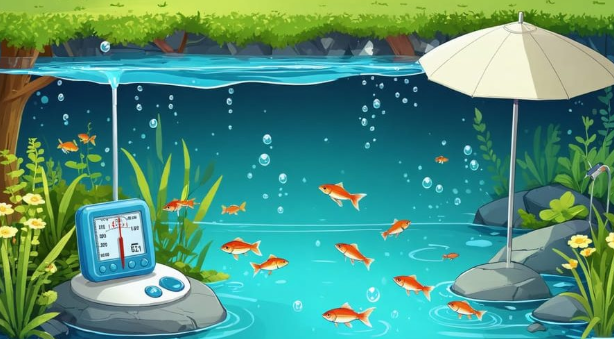When we talk about fish, one of the most important factors that affects their health, growth, and survival is fish temperature. Whether fish live in natural rivers, lakes, oceans, or man-made aquariums and ponds, temperature controls their behavior and overall well-being. Fish are cold-blooded animals, which means their body temperature depends on the environment around them. A slight change in water temperature can either help them thrive or put their life at risk.
Understanding the correct fish temperature is crucial not only for fishermen and aquarists but also for scientists, fish farmers, and nature lovers. By learning about the ideal water temperature for different species, we can help fish live longer, grow stronger, and avoid unnecessary stress.
Why Fish Temperature Matters
Fish rely on water temperature to regulate their metabolism, movement, and feeding patterns. Unlike mammals, they cannot generate their own body heat. Instead, their body temperature matches the water around them.
- If the water gets too cold, fish may become slow and eat less.
- If the water gets too warm, they may become stressed, consume more oxygen, and risk diseases.
Fish temperature also affects reproduction. Many fish lay eggs only in specific temperature ranges. If the temperature changes too much, breeding can fail, leading to a decline in fish populations.
Warm-Water Fish vs. Cold-Water Fish
Not all fish need the same water temperature. Some thrive in warm waters, while others prefer colder conditions.
Warm-Water Fish
Species like tilapia, catfish, bettas, and guppies are considered warm-water fish. They usually need water between 75°F to 85°F (24°C to 29°C). These fish grow faster in warmer water but can suffer if the water gets too hot.
Cold-Water Fish
Species like trout, salmon, and goldfish are cold-water fish. They thrive in cooler temperatures, often between 50°F to 68°F (10°C to 20°C). Cold-water fish need oxygen-rich water, and cooler temperatures help keep oxygen levels higher.
How Temperature Affects Fish Behavior
- Feeding Habits – Fish eat more actively when water is in their ideal temperature range. Outside that range, they may refuse food.
- Swimming Speed – In warmer water, fish may move quickly, but in colder water, they become sluggish.
- Oxygen Needs – Warmer water holds less oxygen, making it harder for fish to breathe.
- Breeding Cycles – Many fish breed only during certain temperature conditions, which signal the right season.
- Stress Levels – A sudden rise or drop in fish temperature can cause stress, leading to sickness or even death.
Fish Temperature in Aquariums
For aquarium owners, keeping the right water temperature is vital. Most tropical aquarium fish need a stable temperature of 75°F to 80°F (24°C to 27°C). Using a heater ensures stability, while a thermometer helps monitor changes.
- Too Cold: Fish may hide, stop eating, and become inactive.
- Too Hot: Fish may gasp at the surface for oxygen and show signs of stress.
Regular checks prevent sudden fluctuations, which are often more harmful than gradual changes.
Fish Temperature in Ponds
Outdoor ponds are more challenging to control because they depend on the weather. Pond fish like koi and goldfish adapt better to changes but still need protection.
- In summer, shade and aeration help lower the water temperature.
- In winter, pond heaters or de-icers keep the water from freezing completely, ensuring fish can survive.
Proper pond design with depth also helps maintain stable fish temperature.
Fish Farming and Temperature
Fish farming, also called aquaculture, depends heavily on controlling fish temperature. Farmers carefully adjust water conditions to ensure maximum growth and healthy stock.
- Tilapia farms maintain warm water conditions for fast growth.
- Salmon farms require cooler water for survival.
If the temperature is not managed properly, fish may not grow, diseases may spread, and farmers may suffer losses.
How Climate Change Affects Fish Temperature
Global warming has a serious effect on fish populations worldwide. Rising water temperatures can:
- Force fish to migrate to cooler waters.
- Reduce oxygen levels, making survival difficult.
- Disrupt breeding seasons.
- Increase disease outbreaks.
For example, coral reef fish are highly sensitive to temperature changes, and warmer oceans are putting their ecosystems at risk.
Tips to Maintain Ideal Fish Temperature
Whether in an aquarium, pond, or fish farm, here are some tips to maintain proper fish temperature:
- Use a reliable thermometer to check water daily.
- Install heaters for tropical fish tanks.
- Provide shade for outdoor ponds during summer.
- Use aeration systems to keep oxygen levels stable.
- Avoid sudden temperature changes when adding new water.
- Research fish species to understand their exact needs.
Common Problems Caused by Wrong Fish Temperature
- Temperature Shock – Happens when fish are moved from one environment to another without adjusting temperature.
- Disease Outbreaks – Warm water encourages bacteria and parasites to grow faster.
- Stunted Growth – Fish in the wrong temperature range may not grow properly.
- Death – Extreme temperatures can be fatal
Conclusion
Fish temperature is not just a number; it is the foundation of aquatic life. Every species has a preferred range where it thrives best. By understanding and maintaining the right water temperature, we ensure fish remain healthy, active, and stress-free. Whether you are a pet owner, pond manager, or fish farmer, paying attention to fish temperature can make a big difference in the survival and success of your aquatic world.
FAQs
Q1. What is the best fish temperature for tropical fish?
Most tropical fish do well between 75°F and 80°F (24°C to 27°C).
Q2. Can fish survive in cold water?
Yes, some species like trout, goldfish, and salmon prefer cooler waters between 50°F to 68°F (10°C to 20°C).
Q3. How does water temperature affect fish breathing?
Warm water holds less oxygen, so fish struggle to breathe in higher temperatures. Cold water usually has more oxygen.

